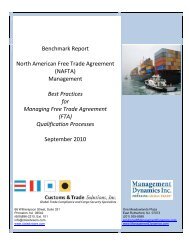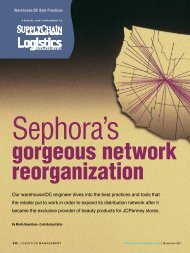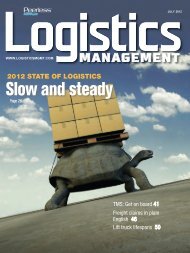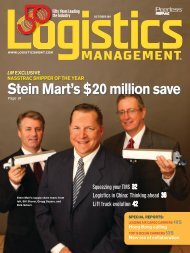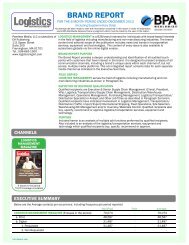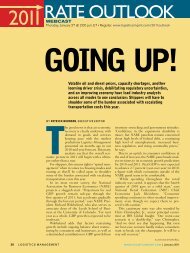Logistics Management - June 2010
Logistics Management - June 2010
Logistics Management - June 2010
Create successful ePaper yourself
Turn your PDF publications into a flip-book with our unique Google optimized e-Paper software.
inside<br />
c Obama, truckers agree, p.17<br />
c Higher rates are coming, p.18<br />
c IBM to acquire Sterling, p.19<br />
Kerry, Lieberman roll out<br />
new energy legislation<br />
American Power Act hones in on GHG reductions, curbing domestic oil usage,<br />
and increasing infrastructure investment to improve transportation efficiency.<br />
ATA opposes, others applaud.<br />
By Jeff Berman, Group News Editor<br />
WASHINGTON—Senators John Kerry<br />
(D-Mass.) and Joseph Lieberman (I-Conn.)<br />
introduced their long-awaited legislation at<br />
the end of May that they claim will transform<br />
the nation’s energy policy from a<br />
national weakness to a national strength.<br />
Entitled “The American Power Act,”<br />
the bill vows to reduce greenhouse gas<br />
emissions (GHG) by 17 percent—compared<br />
to 2005 levels—by 2020 and 83<br />
percent by 2050, matching an objective<br />
put forth by the White House last year.<br />
Looking at the bill’s action items from<br />
a supply chain and freight transportation<br />
perspective, one of the bill’s most<br />
notable takeaways is a goal to decrease<br />
U.S. dependence on foreign oil. The<br />
Senators want to do this through myriad<br />
steps, including investing more than<br />
$6 billion per year in transportation<br />
infrastructure to increase efficiency<br />
and decrease oil consumption; investing<br />
nearly $2 billion for state and local<br />
projects that reduce oil consumption<br />
and GHG; and nearly $2 billion for the<br />
Transportation Investment Generating<br />
Economic Recovery (TIGER) Discretionary<br />
Grant Program.<br />
Another transportation-specific measure<br />
includes a $6 billion annual subsidy<br />
allocated for increased efficiency<br />
and lowering oil consumption in the<br />
transportation sector. Regarding domestic<br />
oil production, the legislation would<br />
Senators John Kerry (D-Mass.<br />
above) and Joseph Lieberman<br />
(I-Conn.) introduced their<br />
long-awaited legislation at the<br />
end of May that they claim will<br />
transform the nation’s energy<br />
policy from a national weakness<br />
to a national strength.<br />
allow coastal states to<br />
opt out of drilling up<br />
to 75 miles from their<br />
shores. While previous<br />
versions of this legislation<br />
included language<br />
that was viewed as “cap<br />
and trade,” this bill has a<br />
somewhat similar offering<br />
but is not described<br />
as cap and trade by its<br />
authors.<br />
In the American<br />
Power Act, there are<br />
provisions for emissions<br />
trading that would take<br />
effect in 2013. Emissions<br />
trading would start at $12 and<br />
$25 a ton and be geared towards utility<br />
companies, with the $12 per ton<br />
increasing at 3 percent over inflation<br />
annually and the $15 per ton increasing<br />
5 percent over inflation annually.<br />
“Rather than allowing a patchwork<br />
of conflicting state and federal regulations,<br />
it lays out one clear set of rules<br />
for reducing GHG,” according to the<br />
language in the bill. Kerry and Lieberman<br />
added that states that already have<br />
cap and trade programs in place will be<br />
compensated for lost revenues due to<br />
termination of their programs.<br />
The Senators also noted that industrial<br />
sources would not enter the emissions<br />
trading program until 2016, at<br />
which point they will receive allowances<br />
to offset direct and indirect compliance<br />
costs.<br />
But, as LM has previously reported,<br />
cap and trade—or any type of exchanging<br />
or trading emissions allowances or<br />
permits—has been widely met with<br />
heavy opposition in freight transportation<br />
and logistics circles. And that sentiment<br />
appears to be the same this time<br />
around as well.<br />
Officials from the American Trucking<br />
Associations (ATA) said that this<br />
legislation will require refiners to purchase<br />
billions of dollars worth of carbon<br />
allowances that correspond to the car-<br />
<strong>June</strong> <strong>2010</strong> | WWW.LOGISTICSMGMT.COM <strong>Logistics</strong> <strong>Management</strong> 15




